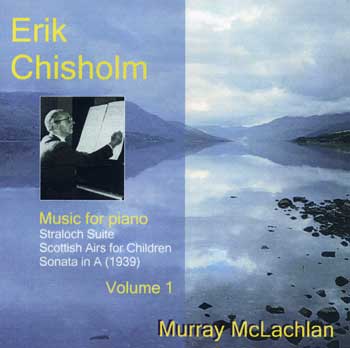Eric Chisholm: Music for Piano, Vol. 1
Straloch Suite
Track 1: Grave-allegro con Spirito-Grave
Track 2: Allegro con energio – allegro scherzando
Track 3: Mesuré-Andante espressivo e tempo rubato-Mesuré
Scottish Airs for Children
Tracks 4 – 25
Sonata in A
Track 26: Molto moderato
Track 27: Scherzo: Allegretto con moto
Track 28: Lament – HMS Thetis
Track 29: Allegro moderato
Total playing time: 77.24
About
Erik Chisholm (1904-1965)
Erik Chisholm was a Scot and an internationalist, with strong left-wing leanings and a mind open to quality, no matter where its source was to be found, As Dean and Professor of the Faculty of Music in Cape Town, and Principal of the South African College of Music he abominated the arrival of apartheid. Such was his openness to experience that he has been accused of eclecticism, as though that were an artistic sin. He would be more justly assessed as a man capable of assimilating ideas from other people, in contrast to those who remain wrapped up in themselves.
This CD celebrates him as a Scot. But there is no parochialism in such a celebration, for the influences of Scottish music to which Chisholm was open were largely ignored by his contemporaries—and by ‘ignored’ one means by people who chose to be ignorant.
The three works featured here all precede his years in Cape Town which started in 1946. It was only there that he found stability of employment, security of income and the institutional support which enabled him to transform the musical scene in much of southern Africa. Scotland never gave him a worthwhile job. But she did give him a source of enduring inspiration, almost heart-breaking in its intensity—for the beauty of the country and its traditional music, which so naturally reflects that beauty, stays with all Scots almost as a wound that leaves a scar.
Here, then, you will experience something of that burning intensity, distilled for young fingers at the piano, poured forth for experienced hands at the keyboard. The music that inspires these pieces is some of the oldest and most deeply entrenched in Scottish culture. The Straloch Suite is drawn from one of our earliest lute manuscripts; the Sonata in A is based upon piobaireachd — the classical music of the Highland bagpipes, with origins at least as old as the 16th century. And in the Scottish Airs for Children one encounters a work of pianistic instruction which is musically alive and beautiful from start to finish. If it was inspired by Bartok’s Mikrokosmos, it is worth pointing out that Bartok came to Glasgow twice at Chisholm’s invitation, leaving with much bagpipe music and a bagpipe chanter under his arm, fascinated by what he had encountered.
Chisitoirn was a quintessential modernist, but his training as a pianist was with the legendary Pouishnoff and his academic training was under Sir Donald Tovey. Theirs was a mutual admiration, based upon the certain knowledge that however much of an enfant terribile Chishoim might have seemed to a douce Scottish public, his mentors knew that his grounding was solid and that his adventures were no more reckless than is proper in the act of creation.

